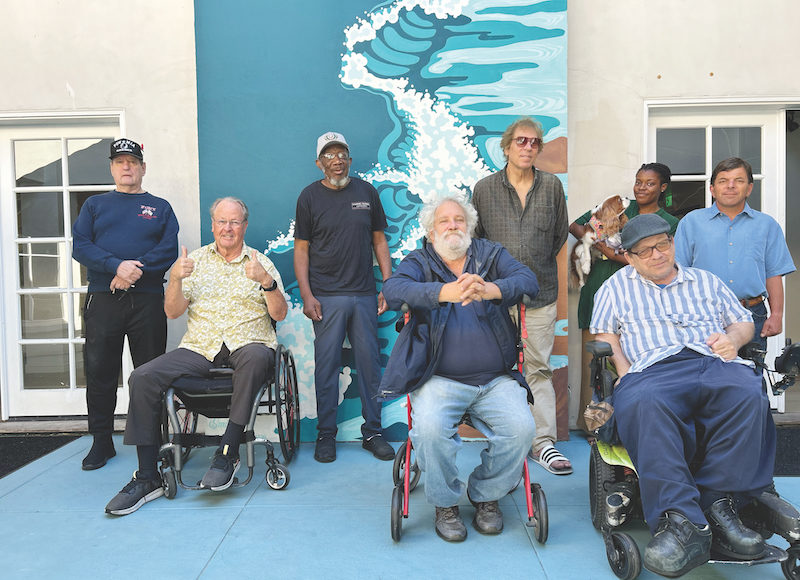Over 70 residents of the St. George Apartments in downtown Santa Cruz are breathing a sigh of relief after the Santa Cruz City Council took a big step toward adopting an ordinance extending rental increase protections for renters like them. This came after a year of uncertainty as a looming November increase would have raised rents up 250% in some cases, according to residents.
After months of urging by tenants and their advocates, city officials moved to reinforce tenant protections under California Assembly Bill 1482, also known as the Tenant Protection Act of 2019. That bill established just-cause eviction protections for renters and only allows landlords to increase 5% plus the change in the cost of living or up to 10%, whichever is lower.
The proposed Santa Cruz ordinance would close a loophole in the state law that left tenants with expiring rental-restriction contracts unprotected.
“[T]he expiration of rental restrictions for some lower-income households will result in their loss of access to shelter and render them homeless. The ordinance proposed here would close the aforementioned loophole and would eliminate the exemption in AB 1482’s rental increase restrictions for tenants in formerly rent-protected units where those protections are expiring,” read part of a city staff report.
The ordinance was drafted by District 4 Council member Scott Newsome, who represents the downtown area where the St. George building sits. The final hearing on the ordinance is slated for the Sept. 24 City Council meeting.
For over 30 years, the St. George Apartments at 833 Front St. has housed low-income tenants without raising rents since 1991, after it was rebuilt in the wake of the Loma Prieta earthquake. At the time, Santa Cruz struck a deal with San Jose-based Green Valley Corporation, which agreed to keep the units affordable for 30 years in exchange for a loan to rebuild.
The St. George property includes 122 single occupancy units that house low-income residents, many of whom are disabled, retired or live on a fixed income. The building has ground-level commercial spaces rented by Bookshop Santa Cruz, Chocolate and Comicopolis. Swenson Builders, which is a subsidiary of Green Valley Corporation, did the rebuild in 1991 and owned and managed the property until 2021.
Last November residents received notice that after a two-year extension to the original 30-year agreement, rents would be raised to market value starting Nov. 1, 2024.
John Daugherty has lived in St. George since 1994. The 64-year-old uses a wheelchair and lives off a pension. He says that not only are the units affordable, but they are fitted to accommodate his wheelchair.
“There are a lot of people here who’ve lived here 10 years and longer (and) some people were
(asking) ‘Where do I move?’ and ‘Am I gonna live my car, or am I just gonna go straight to being homeless?’” Daugherty says.
Cindy Hershberger, 69, has lived at the complex for 13 years and survives on her $1,100 per month Social Security allowance. Her $750 monthly rent has not increased the entire time she’s lived here, but after Nov. 1 it was due to increase to $1,600 — $500 more than her total monthly income.
“Most of us here that are affected, we’ve been long-term tenants and we don’t want to become homeless, especially on November 1, with the start of winter and the rainy season,” Hershberger says.
After residents received the bad news in November 2023, some reached out to their networks for help, including Hershberger, who attends Calvary Episcopal Church in Santa Cruz. This got the Association of Faith Communities involved. The AFC advocates for vulnerable members of their community, particularly around tenants’ issues. The organization began putting pressure on city officials and pushed to open talks with Green Valley Corporation.
Representatives for Green Valley could not be reached for comment.
Judy Hutchinson, board chair for AFC, says that it took a year-long effort to get officials to act and propose the ordinance.
“We’re cautiously optimistic because it’s not over yet—we just got through the first hurdle. AFC is doing this so this nightmare of theirs will go away. That’s all we want to happen,” Hutchinson says.
According to Hutchinson, Green Valley has not engaged with the residents or the city, but she thinks the company could benefit by “grandfathering” the current tenants into the previous rental agreement while raising rents on new tenants. Hutchinson adds that while Green Valley has not publicly stated opposition to the city’s proposed ordinance, AFC wants to open a dialogue for the involved parties to come to an agreement.
Kevin Cummings, a 70-year-old St. George resident, says that the pressure campaign by AFC and the tenants was needed to bring about results. He felt that their concerns were initially brushed off when residents first brought them up last year.
“You want to make (city officials) feel uncomfortable to say ‘No’ and comfortable to say ‘Yes,’” Cummings says.
Cummings adds that to see veterans’ advocates, advocates for the disabled and city officials come together is heartening. He also praises the efforts of Newsome and City Attorney Anthony Condott, but is aware that the ordinance might get some pushback.
“I think the great thing that Newsome and Condotti came up with… it’s not overly broad, it’s a very narrow ordinance. I can see people getting riled up that maybe shouldn’t, because it’s not going to affect them. It’s a very narrowly constructed ordinance, and it’s a perfect solution as far as I’m concerned.”













I’ll tell ya, I sure hope so, too. Woof.